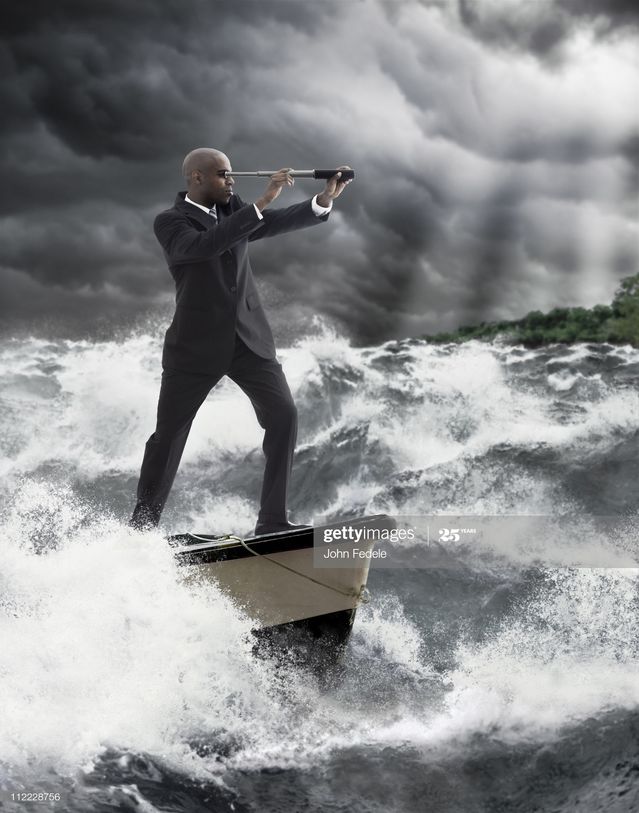Coronavirus Disease 2019
The Coronavirus as a Calling
4 emotional and spiritual opportunities in the current pandemic.
Posted March 21, 2020 Reviewed by Kaja Perina

“Heroes are not born. They’re cornered.” —Redd Foxx
I recently constructed a timeline of the growth spurts in my life, and saw that many of them were preceded by a crisis or loss of some kind, reminding me that chaos is part of the creative process, as any artist will tell you.
In fact, in the Greek creation myths from which the original word comes, chaos is the pure potential from which all things and all beings emerged, and in the central creation story in the Western canon (Genesis) Chaos with a capital C is described as the condition of the Earth before it was formed, ie Chaos precedes Creation. If you deny yourself the one you're going to deny yourself the other.
It stands to reason, then, that we have to be willing to get shaken up, to submit ourselves to the dark blossomings of chaos in order to reap the blessings of growth. Much of this is verifiable: setbacks often prompt breakthroughs, protest abets the cause of democracy, fracture triggers the engineering of a bone-bridge between broken ends.
Whenever a vaccine finally shows up for the coronavirus, it will be based on this very wisdom, which is the bedrock of the entire science of immunology: we introduce a little chaos into the system in order to help strengthen it, shake it up for the sake of helping it evolve.
Most of us surely have a few of these falling-up experiences in our timeline, these “directive crises,” and with the pandemic maybe adding a new one to the list. And it explains why the alchemists—those mystical chemists who sought an elixir that would cure all ailments and worked toward it by striving to turn lead into gold—didn’t try turning silver into gold, or copper into gold, or platinum, or any of the exalted metals. They worked instead on that bottom-dweller, that plainest, basest of metals: lead. If there's a cure for what ails us, they were saying, it's most likely to be found in the common rock, in the philosopher’s stone of our everyday sufferings and infirmities.
Not to diminish the fact that we're dealing with a serious and worldwide epidemiological threat, this latest infirmity is also lead that can be transmuted into golden opportunities, especially if we follow the sometimes blind spiritual instinct that tells us this crisis—indeed each of our individual lives—has purpose and meaning, and that we need to act on this impulse despite the temptation to back down and run for cover.
We need to harbor the kind of hope about which the playwright Vaclav Havel spoke when he said, “Hope is not the conviction that something will turn out well, but the certainty that something makes sense, regardless of how it turns out.”
I'm therefore inclined to wonder what this experience might be calling-for from us, individually and collectively, what alchemy and opportunity we can wrest from it? (And I'm not referring to the kind of opportunism in which you buy up all the hand sanitizer in a 3-state area and price-gouge people by selling it online for ten times what it's worth at Walgreens.)
Here, then, are 4 potential opportunities:
1. Use it as a reset
It isn't often we're faced with such a disruption of our daily schedules and appointed rounds. We can't go to restaurants, movie theaters, bars, dance clubs, churches or temples, our meetup groups and conferences have all been cancelled, and our shopping, schooling and socializing curtailed. Millions also live in cities that have mandated “sheltering-in-place”—staying home unless you have essential errands to run—and work for employers who have closed up shop.
It's therefore impossible to conduct busyness-as-usual, and you may be left with unaccustomed time on your hands. But once the shock of that subsides a bit, and you've done all the panic-shopping you can, you may find it an opportunity to reasses how you spend your time, and how much of it is caught up in restless and relentless pursuit. The Declaration of Independence does of course promise us the pursuit of happiness, but not the achievement of it, or even the enjoyment of it. And you may come to question that equation for yourself during this phase.
Like the asteroid that ushered out the dinosaurs and gave the mammals underfoot a shot at prominence, once the thunder lizards of everyday busyness and distraction are sidelined, parts of you that are normally overshadowed may be given an entrance cue—not just projects you've back-burnered in deference to the daily grind, but deeper thoughts and feelings about your priorities, the status quo, work-life (im)balance, or yourself.
These may or may not be welcome arrivals, and for many the experience of sheltering-in-place may feel less like an opportunity for rest, reading, stillness and self-awareness than like house-arrest—especially if you suddenly have kids to home-school and lost income to recoup—but it's still a rare opportunity to give these exigencies some devoted attention. The better part of valor and wisdom may lie in asking “What can I learn here?” rather than “How can I overcome this?”
Like having a cold or an accident, the pandemic can give you some much-needed time out. And like anything breaking down that you've come to rely on—your car, your phone, your body—it can remind you how much you take that thing for granted. Besides, all too soon things will likely return to “normal,” and the chance to do some vital self-reflection and make some new choices may be lost.
2. Consider it a powerful meditation
Meditators often discover that when they sit down to meditate, they’re distracted by a blizzarding confetti of noises, self-talk, and the general dither of daily life—the dog barking, the children fighting in the next room, the heater rattling, the planes going by overhead. Meditation teachers usually tell us that distractions aren't obstacles to the meditation, they are the meditation. So when the dog barks, you say to yourself, “Ah, the dog-bark meditation.” When the neighbor's weed-whacker fires up, you invoke the “weed-whacker meditation.”
Same with the coronavirus. Approach it not just as a distraction from your goals and a block to your intentions, but a vehicle of meditation and contemplation itself: How do you feel, what wants to emerge, what do you truly know?
As Lynn Ungar writes in her poem Pandemic:
“What if you thought of it
as the Jews consider the Sabbath—
the most sacred of times?
Cease from travel.
Cease from buying and selling.
Give up, just for now,
on trying to make the world
different than it is….”
3. Appreciate it as connective tissue in the body politic
“The space between us, is it a space that separates us or a space that unites us?” —Psychologist June Singer
The coronavirus offers a graduate course in both spirituality and systems theory—the understanding of interconnectedness, oneness, and unity. That is, we're seeing firsthand how our individual actions can affect those around us, for better and for worse, and that we depend on one another for survival. The simple act of washing your hands, for instance—and the more complicated act of sheltering-in-place—is one of both self-care and community care.
In his book Tribe: On Homecoming and Belonging, Sebastian Junger opens with a story about hitchhiking across the country and meeting a man on the road who asked him if he had any food. Thinking it a prelude to a robbery, Junger told him “just a little cheese,” though his backpack was filled with food.
“Well, you can't get to California on just a little cheese,” the stranger said. And though it turned out the man lived in a broken-down car, he offered Junger the contents of his lunch-box. “I saw you from town and just wanted to make sure you were ok,” he said.
“I thought about that man for the rest of my trip,” Junger reflects. “I thought about him for the rest of my life. He'd been generous, yes, but lots of people are generous. What made him different was the fact that he'd taken responsibility for me.”
He goes on to explain that people so often feel the most alive in the midst of collective crises—wars, natural disasters, pandemics—because (contrary to the circle-your-wagons school of thought) their human nature has a rare chance to express itself, to act on the natural inclination to band together and embody the unity and compassion that are just an evolutionary inch below the surface of their normally alienated and alienating modern social lives. Which is also why it's so painful to return to our dis-unified lives after the threat has passed, when once again people are often out for themselves and there's little sense of collective purpose or responsibility.
I remember that in the weeks following the 9/11 attacks, when the fiction of our invulnerability was so shockingly revealed, many of us found ourselves acting a little differently. We held doors open for strangers, spent more time with our kids, paid the tollbooth fare for the driver behind us, honked less, listened more. Passions and loves were released. Parts of us that were frozen thawed a bit. Emotions rose to the surface for a gulp of air. Our involvement in life intensified. In other words, life’s fragility, our fragility, woke us up.
Given that we're being instructed if not commanded to keep physical distance from many of the relationships and communities—the people—in our lives, the coronavirus is a call for gratitude toward them. Science has been telling us for years how dangerous social isolation is for our health, and now that it's suddenly forced on us, it may remind us how precious those connections are.
4. Approach it as a memento-mori (Latin: remember thou art mortal)
The pandemic is a perfect opportunity to not only practice grounding yourself amidst turmoil, testing your resilience and coping skills, but practicing the fine and fearsome art of non-attachment, because life will ultimately ask you to surrender everything. Not just your work and routines, your plans and projects, the lifestyle to which you've become accustomed—but your whole life. “We all owe God a death,” Shakespeare said, so we owe it to ourselves to practice for the occasion whenever possible.
The coronavirus may have you up nights mainlining the serenity prayer, but it offers a superb opportunity to remember something that's undoubtedly in the recesses of everyone's minds right now: mortality. The fact that we each have a use-by date, and it could come (and we could go) at any time.
The pandemic is thus a potent and potential mortality meditation that can help you clarify what’s important and how to best use your precious nick of time. Death is a great clarifier, and cuts the crap. It's like waving ammonia under your nose—a whiff of it is a powerful stimulant. The reality of death defeats us, but the idea of death can liberate us.
The philosopher Martin Heidegger considered the contemplation of one’s own death not morbid curiosity but an act of genuine courage, one that leads to a state of being that he almost ecstatically describes as “passionate anxious freedom.” A state in which you strip yourself of any illusions of immortality, refuse to be tranquilized into witlessness about the fact of death, and are thus free to live your life to the fullest.
Death is something we know all about but don’t really know at all. On one hand, we’ve heard it all before: life is short, here today gone tomorrow, ashes to ashes and dust to dust, out out brief candle, death and taxes, to be or not to be. On the other hand, many of us know it intellectually but not emotionally. It hasn’t really penetrated to the level where it impacts behavior and decision-making, something the coronavirus is offering us in spades.
It reminds me of an old episode of Peanuts in which Snoopy is conversing with a fruit fly, whose life span is only 24 hours, and who confides his one regret: “I wish I knew at nine o’clock what I know now.”
For more about passion, visit www.gregglevoy.com




